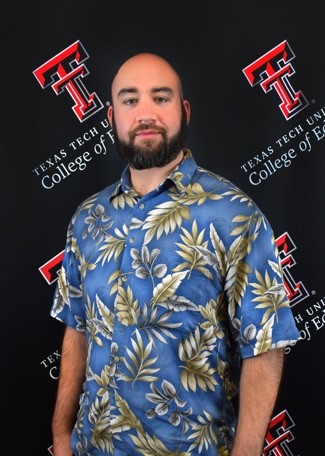Curriculum Studies and Teacher Education
Program Description
The Curriculum Studies and Teacher Education specialization is designed for people who want an in-depth understanding of the issues that are faced by curriculum and teacher education specialists, regardless of whether they are leaders in a classroom, at central office, an agency, a professional organization, the community college or the university. The program provides opportunities for students to develop an understanding of the philosophical, cultural, ethical, political, and historical contexts that influence curriculum design, development, delivery, and evaluation.
Tuition Cost Estimate
For the most accurate estimates of tuition please see the Cost Estimator located on the Student Business Services page. Below estimates do not account for potential scholarships, assistantships, or program-specific fees added to your bill. Please also remember that this not a tuition guarantee as the Texas Tech Board of Regents reviews tuition and fees annually.
| Texas Resident | Out of State Resident | International Student | |||
| On-Campus | Online | On-Campus | Online | On-Campus | Online |
| $2,867 | $2,687 | $5,297 | $2,687 | $5,372 | $5,192 |
Get a detailed tuition estimate ❯ - all fully online graduate students should select "TTU Online."
Degrees Offered
Ph.D. in Curriculum and Instruction, with a track in Curriculum Studies/Teacher Education (CSTE).
Modes of Delivery
Offered: face-to-face* or online
* Face-to-face delivery is available as a cohort, yet there is no cohort for the fall 2026 semester.
* Face-to-face delivery is available as an individual only if you have been invited by a C&I faculty member to apply as an on-campus student and serve as a graduate research assistant.
** We do not review applications for face-to-face delivery if you apply outside of a cohort year or were not invited by a C&I faculty member to apply
Online / Synchronous Expectations of the Ph.D. in C&I program
The Ph.D. in C&I program can be completed completely online, but there are courses and degree milestones that require mandatory synchronous meetings via virtual meetings and video conferencing software.
- Coursework: Most C&I doctoral online classes have synchronous meetings via Zoom to maximize the effectiveness of teaching and learning; those classes may or may not require attendance at synchronous sessions as a part of the course grade. If such courses have mandatory synchronous meetings, they are noted at the time of registration (so you will know before signing up).
- Degree Milestones: Applicants should be aware that live, synchronous interaction is not only part of the coursework but also required to complete their qualifying exam (oral), proposal defense, and final dissertation defense. These milestones may be completed remotely and online, but not asynchronously.
Career Opportunities With This Degree
A Ph.D. in Curriculum and Instruction may prepare you to work as a teacher, trainer, or education researcher. The degree can also lead to work in academia, government and business. It can also lead to a teaching career at the university level. If you are an EC-12 teacher, a Ph.D. in Curriculum and Instruction may provide opportunities for leadership roles as curriculum and instructional leaders in your school or district. This degree will provide coursework in research methods, statistics, and policy. These areas are highly valued in government agencies and businesses. Large corporations often have their own education departments and have needs for curriculum designers and trainers.
Application Materials
The Ph.D. program in Curriculum and Instruction requires a completed master's degree in the field of education or cognate areas of study from an accredited higher education institution in the United States or equivalent higher education institution in another country.
All programs require that you submit an online application through the Graduate School.
College Transcripts – Unofficial transcripts can be uploaded to the Graduate School application. Information on submitting official transcripts will be provided to you by the Graduate School. Grade reports or unofficial transcripts from university web portals will not be accepted. Please redact the Social Security Number anywhere it appears on your transcript. If documents are written in a language other than English, a copy of a complete and official English translation must be provided with the original language records.
Required Supplemental Application Materials
Curriculum Vitae (CV), Research Statement, Three Letters of Recommendation, Writing Sample. Download the list of required supplemental application materials.
Application Process
Please visit the Graduate Application Process for more information on how to apply.
- Doctoral applications for Fall 2026 open October 1st. The application deadline is January 15th, 2026.
Semester in which the program can be started
Fall enrollment only.
Estimated Hours to Completion
63 hours of coursework.
Financial Aid
Scholarships and assistantships for doctoral students are available through the office of graduate education and research in the College of Education.
Tuition & Fees
Use the Student Business Services Tuition Estimator to estimate your costs.
Ph.D. Admissions Process
- Ph.D. applications are in fall only. Application portals open in October and close in December.
- Applicants may only apply to one track for consideration of admission; please refer to track website for information on each track.
- All application materials considered for review MUST be submitted to the portal; any materials sent outside of the application portal (via email) cannot be considered.
- Applications are only reviewed when complete; required application materials are provided on the website for each track.
- Applications are reviewed in a holistic manner; GRE scores are not mandatory but may be optionally supplied; then they are included in the holistic review of applications. GRE scores may play an important role should there be deficiencies and/or gaps in other areas of the application. However, applicants will not be penalized if they do not submit GRE scores.
- The department informs the Graduate School of admission decisions in January.
- The Graduate School issues letters of admission in February; the C&I department does NOT communicate to applicants about admission status until AFTER the official letter is issued.
- The C&I department does NOT provide applicants reasons for non-admission; refer queries to the Graduate School graduate.admissions@ttu.edu.
- If an applicant is denied admission to the track, that is a denial of admission to the entire program. You may reapply the following year with revised application materials to the same or a different track.
Contacts
Cruz, Joshua, Ph.D.Associate Professor, CSTE Track Program CoordinatorCurriculum & InstructionJoshua.Cruz@ttu.edu (806) 834-3435

Chance WebbAcademic Advisor / AdmissionsOffice of Graduate Admissions & Enrollmentgradadmissions.educ@ttu.edu 806-834-6768
Faculty
Dr. Faith Maina is interested in teacher education and social justice, specifically, culturally sustaining pedagogies, multicultural education, cultural variance in teacher preparation, and fairness in graduate education. Her students have written dissertations on a variety of topics including "Communicative Language approaches in Vietnam," "Doctoral students' attrition in Kenya," "Science teacher preparation in Saudi Arabia," "Teacher attrition," "Black girls in Mathematics," "Culturally relevant teaching in high school science," and "African American parents' perceptions of their children in STEM classrooms." She is active in the American Education Research (AERA), the Society for Information Technology and Teacher Education (SITE), the Kenya Scholars and Studies Association (KESSA), and the Carnegie African Diaspora Scholars Alumni (CADF)-2018. She has also served as a Fulbright Scholar (2011-2012).
Dr. Jeasik Cho is interested in curriculum theory, compassion as praxis (moral anger and outrage as a mobilizer for social justice), critical multicultural education, qualitative research (validity, evaluation of the quality of qualitative research), culturally relevant metacognition, rural education, formative assessment, and blended and personalized learning. His students have written dissertations on a variety of topics, including “Afro-Brazilian undergraduate women of partners of the Americas,” “The family English literacy interactions of Muslim refugee & immigration mothers and daughters using a Symbolic Interactionism-Multiliteracies framework,” “The characteristics of culturally relevant engagement in two urban high school science classrooms,” and “Holistic validation in Posthuman research: Jazz Scat-Thinking as a way forward.” He is active in the American Education Research Association (AERA), The Bergamo Curriculum Theory and Classroom Practice, The Qualitative Report (TQR), and the Korean Association for Multicultural Education (KAME).
Dr. Joshua Cruz is interested in the development and advancement of qualitative methods, critical approaches, post-structural approaches, historical approaches, post-secondary education, mentoring and preparation for the college experience, academic writing, engineering education, student epistemologies, student identities, and empathy and soft skills. His students have published dissertations on a variety of topics, including “Queering educator orientations toward culturally and linguistically diverse students,” “Servant leadership in Seventh Day Adventist schools,” “Foucauldian history (genealogy) of digital literacy,” and “Exploring the uses of short, ad hoc videos to create instructor 'presence' in online education environments.” He is active in the American Educational Research Association (AERA), the Literacy Research Association, and the American Society for Engineering Education.
Dr. Jairo I. Fúnez-Flores is interested in Latin American student movements and social justice movements implicated in education. He is also interested in Decolonial Theory and the geopolitics of curriculum, Space/Place Theory, Critical Ethnography, and Activist Research. He is active in the American Education Research Association (AERA), the Curriculum and Pedagogy Group, and the Latin America Council of Social Sciences.
Fast Facts
- Hours to Completion: 63
- Doctoral applications for Fall 2026 open October 1st. The application deadline is January 15th, 2026.
College of Education
-
Address
Texas Tech University, College of Education, 3002 18th Street Lubbock, TX 79409 -
Phone
(806) 742-2377 -
Email
educ.webmaster@ttu.edu

